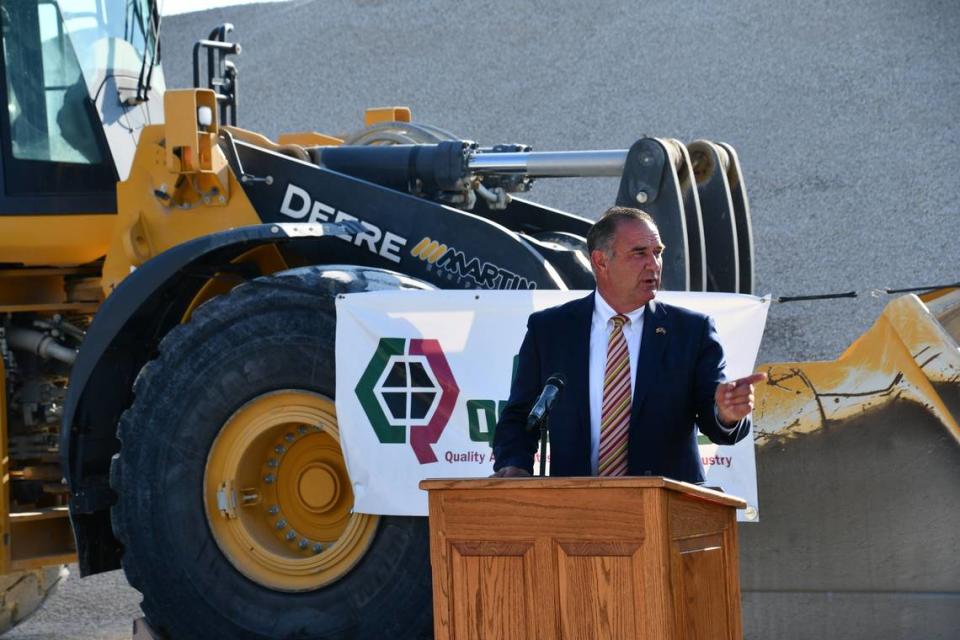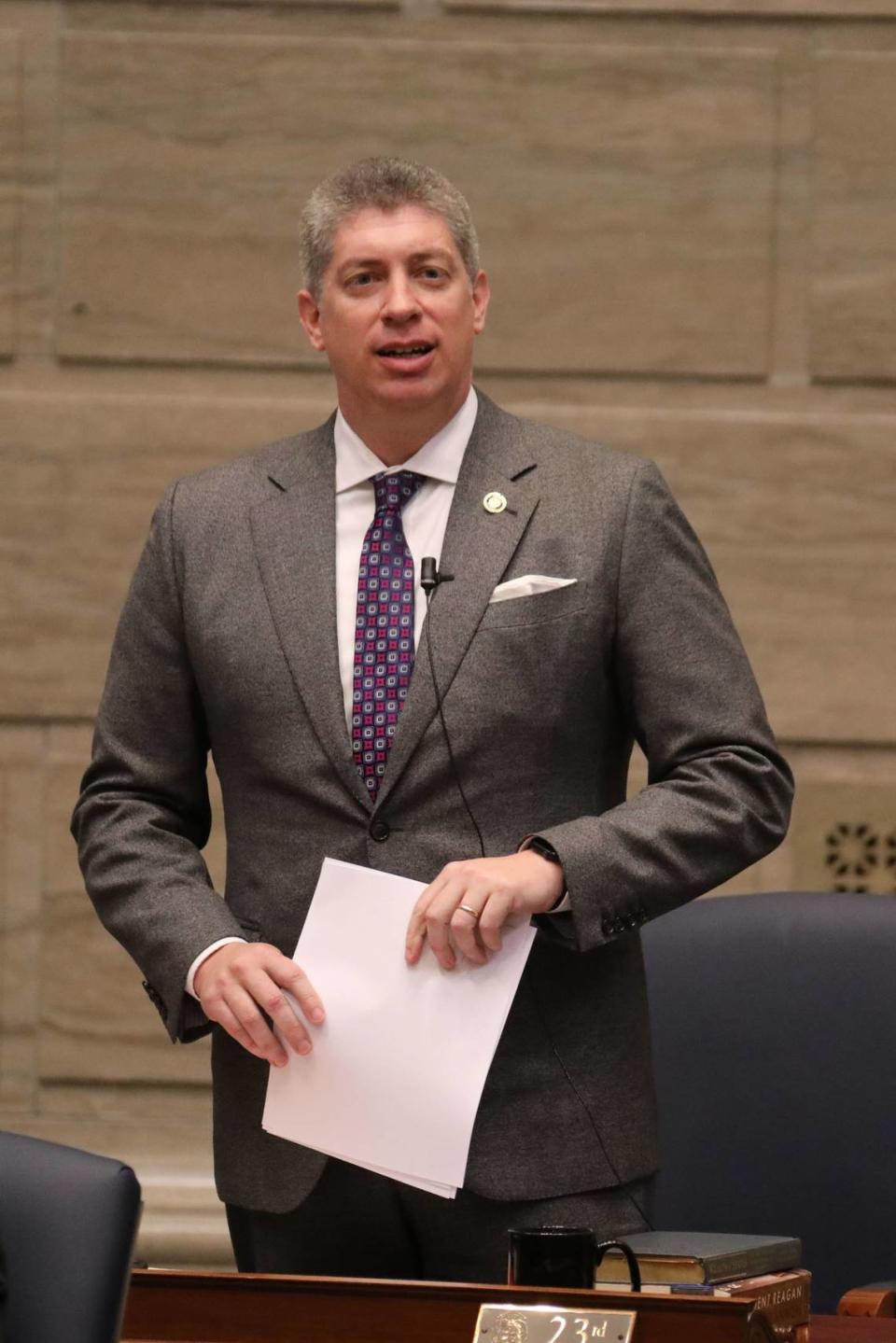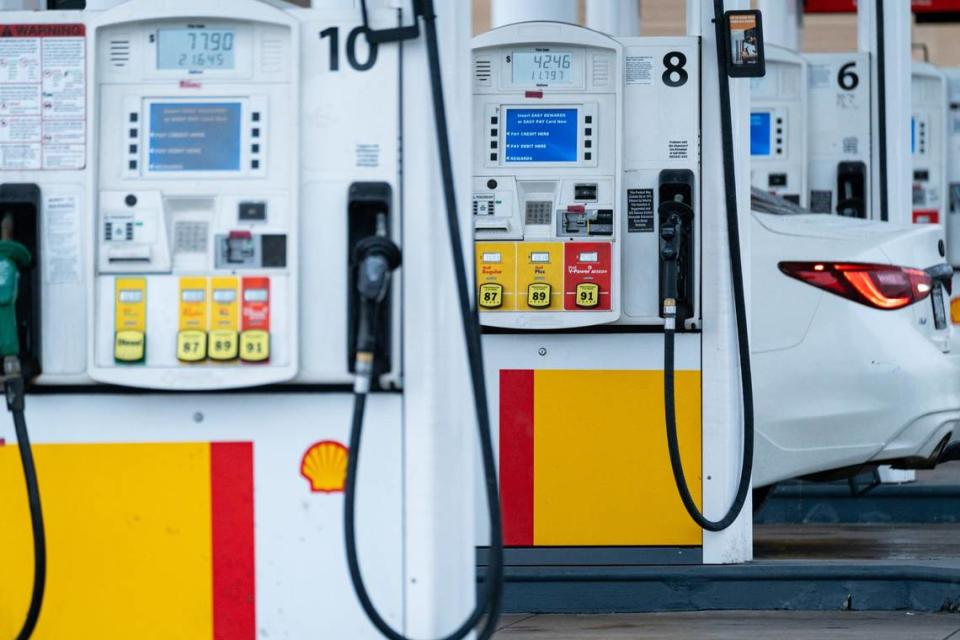Mike Kehoe helped raise Missouri’s gas tax. Will voters punish him in governor’s race?
- Oops!Something went wrong.Please try again later.
- Oops!Something went wrong.Please try again later.
- Oops!Something went wrong.Please try again later.
Reality Check is a Star series holding those with power to account and shining a light on their decisions. Have a suggestion for a future story? Email our journalists at RealityCheck@kcstar.com.
When proponents of raising Missouri’s gas tax launched an unsuccessful campaign in 2018, Lt. Gov. Mike Kehoe praised the effort. After state lawmakers finally increased the tax in 2021, the first time in 25 years, he participated in celebratory signing ceremonies.
“This is not a Democrat or Republican issue,” Kehoe said in 2018.
It is very much a Republican issue now.
For months, Kehoe has come under relentless attacks for his past support of gas tax increases. He faces two major opponents in the Republican race for Missouri governor – Secretary of State Jay Ashcroft and Sen. Bill Eigel of Weldon Spring. Both have seized on Kehoe’s gas tax record to suggest the lieutenant governor would eagerly raise taxes if he secures the top job.
The gas tax represents a core funding source for roads and highways across Missouri. Before 2021 the gas tax was 17 cents a gallon but is rising to 29.5 cents by July 1, 2025, generating more than $400 million in additional annual revenue.
Kansas City alone receives millions each year for transportation. Over the past decade, more than $134 million has gone to the city, according to data from the Missouri Department of Revenue. Annual revenue to the city has also jumped since the gas tax began increasing, from about $12.3 million each year to $18.1 million in 2023.
But the tax is politically volatile, with Kehoe fighting for the support of conservative voters who are quick to reject tax increases. The Aug. 6 primary election will reveal whether those voters punish Kehoe as a gas tax hike supporter or reward him for his stewardship of Missouri infrastructure.
“Any time that the gas tax increase is brought up, it has a very negative connotation,” said Rep. Michael Davis, a Republican who represents Belton and Raymore south of Kansas City.
“I don’t know if that would be different in other parts of the state – maybe in rural parts it would be different,” Davis said. “But in my district, currently pretty much 100% suburban ... it’s extremely unpopular with the primary voters who I’ve discussed it with.”
Kehoe’s political and business careers have long been closely linked to transportation. Now 62, Kehoe in his 20s helped revive a mid-Missouri company that converted vans. He purchased Ford and Lincoln-Mercury dealerships in Jefferson City in the early 90s, beginning to build a public profile in the capital city.
Gov. Matt Blunt gave Kehoe his entry into politics in 2005 by appointing the car salesman to the Missouri Highway and Transportation Commission. By 2009 Kehoe chaired the commission, paving the way to his election to the Missouri Senate the following year. Gov. Mike Parson, who formally endorsed Kehoe on Thursday, appointed Kehoe as lieutenant governor in 2018 after Parson, the previous lieutenant governor, became governor.
Kehoe has been a vocal proponent of transportation funding throughout his time in elected office. More than a decade ago, he championed the idea of a statewide transportation sales tax. Voters rejected a proposed ¾ cent sales tax increase, but Kehoe’s comments from that period underscore how the possible future governor saw transportation as crucial to the state’s future.
“Good, safe and reliable transportation infrastructure is foundational for Missouri’s economy,” Kehoe said at the time. “If we don’t have it, we fall behind. If we cannot maintain it, we fall behind.”

Voters rejected tax hikes
Missouri voters over the years have repeatedly said no to higher taxes for transportation. Nearly 60% of voters rejected the sales tax increase in 2014. About 54% said no to a higher gas tax in 2018.
The 2021 gas tax plan was the result of action by the General Assembly, not voters. While the Missouri Constitution limits tax increases without voter approval, lawmakers sidestepped those constraints by including a refund program allowing motorists to get back the additional fuel tax they pay at the pump. Of course, many drivers don’t bother going through the refund process or don’t keep the necessary records.
As lieutenant governor, Kehoe presided over the Missouri Senate but didn’t have a vote on the 2021 plan. Still, Parson credited Kehoe for helping get the bill passed. When Parson held ceremonial signing ceremonies across the state, Kehoe attended events in Springfield and St. Louis.
Three years later, Ashcroft and Eigel are betting they can direct voters’ past distaste for transportation-based tax increases into opposition to Kehoe.
Their campaign websites both use the moniker “Tax Hike Mike” and outline his past support for gas tax increases. That includes votes in 2015 and 2016 as a state senator, in addition to his support for the 2018 statewide ballot measure and 2021 legislation.
Ashcroft’s campaign, in an ad released earlier this month, doubled down on the attack, promising to repeal “Mike Kehoe’s gas tax.”
“Tax hike Mike Kehoe sponsored the increase in the gas tax,” the ad said. “No wonder — Tax hike Mike doubled government spending.”
Last week, Eigel criticized Kehoe for skipping a debate in St. Louis County, saying he was “terrified to face the voters or explain why he’s called Tax Hike Mike.”
“No-Show Kehoe is too chicken to debate because he’s a Democrat in disguise who doesn’t feel accountable to the voters,” Eigel said in a statement.
While Kehoe has been more vocal over the years than his opponents in emphasizing the importance of transportation funding, Eigel himself previously sponsored legislation that would have raised the gas tax. As introduced, it would have raised the gas tax to 23 cents per gallon, while reducing state income tax rates and setting annual caps on tax credits.
And Ashcroft’s office in court defended the 2018 ballot measure against a lawsuit seeking to have it thrown off the ballot over allegations the proposal violated the Missouri Constitution.

The Kehoe campaign emphasized his support for tax cuts. Kehoe, Ashcroft and Eigel have all voiced support for ending state income taxes.
“Mike Kehoe is a tax cutting conservative who has supported over $2.4 billion in tax cuts. While other candidates are running on false desperate attacks, Kehoe is focused on his plan to deliver real conservative results for Missourians as governor, including eliminating state income tax,” Kehoe spokeswoman Gabby Picard said in a statement.
The GOP race appears tight. A poll of 600 Republican primary voters conducted in late June by ARW Strategies, a national polling firm, found 23.6% support Kehoe, 19.2% support Eigel and 18.9% support Ashcroft. The margin of error was plus or minus 4%.
If Kehoe loses even a small percentage of voters over his gas tax stance, the result could prove fatal to his campaign. But interviews suggest a divide over how much the issue matters in the election.
“Gas tax has been an issue,” said Kirk Doan, president of the Greater Kansas City Pachyderm Club, said before the club met on Tuesday. “People say, well, what are taxes for? The idea that you link a tax to every little goodie – well, what do we pay our general taxes for?”
Doan, who as the club’s president isn’t endorsing a candidate in the primary, said the GOP governor’s race appears tight in the Kansas City area, reflecting statewide polls.
Michael Smith, a club member from Grandview, was less sure the gas tax is a prominent concern for GOP voters. Smith, who supports Eigel, indicated property taxes are a greater worry.
“I think it’s probably low on the list,” Smith said of the gas tax. “There’s a lot of things that are more important than that.”
Sen. Mike Cierpiot, a Lee’s Summit Republican, voted against the 2021 gas tax increase, saying that voters should have decided the matter. But he adamantly disputed Eigel and Ashcroft’s attacks on Kehoe, emphasizing that Kehoe had no vote on the bill.
“I think Mike supported, like most people realized, that funding for transportation in Missouri needed to be changed,” Cierpiot said.

Inflation, EVs eat into revenue
Each cent of gas tax yields about $27.8 million a year in funding for the Missouri Department of Transportation and $11.8 million for cities and counties, according to the agency. Missouri ranks 48th nationally in revenue per mile – in other words, Missouri ranks nearly last in generating revenue for every mile driven – and for years had among the lowest gas taxes in the country.
Even after the increases approved in 2021, Missouri still has a very low rate. Neighboring Illinois collected 66.5 cents per gallon in 2023, according to the Washington-based Tax Foundation. Iowa collected 30 cents that year. Kansas set its rate at 25.03 cents.
Before 2021, Missouri had last raised its gas tax in 1996. Over the years, inflation reduced the purchasing power of the revenue collected. And gains in vehicle fuel efficiency meant motorists traveling the same amount of miles over time paid less in gas tax as they upgraded to newer cars and trucks.
Electric vehicles also represent a rapidly growing challenge to gas taxes, said Adam Hoffer, the Tax Foundation’s director of excise tax policy. Future solutions may include taxing drivers based on miles driven, he said, but significant challenges exist – including whether residents and politicians would tolerate some form of vehicle tracking.
For now, gas taxes remain one of the taxes most noticed by consumers, Hoffer said.
“We know that gas prices fluctuate … at the same time when there’s a tax increase those prices go up and they don’t come down as much very often,” Hoffer said. “It can feel like there’s a big billboard on the side of every single road whenever you increase the tax.”
Dave Schatz, a former Republican state senator from Sullivan who sponsored the 2021 legislation, acknowledged raising taxes isn’t necessarily a popular Republican position but said those who use the roads and highways pay the gas tax.
“When people say they’re not in favor of gas tax, tell me how we’re going to maintain our road and bridge system,” Schatz said.
He noted that the last governor to sign a gas tax increase into law was John Ashcroft – Jay Ashcroft’s father.
“Obviously it’s popular with these, I would say what I would say hard-right conservative people, that don’t want any new taxes, but they don’t tell you how they’re going to pay for it,” Schatz said. “They just say well we’ll repeal the tax, but what are they going to replace it with?”
Sen. Denny Hoskins, a Warrensburg Republican running for secretary of state, opposed the increase. He pointed to the state’s overall growing budget.
“I think it is a big issue. Our Republican Party platform says that we support … lowering taxes, not increasing taxes,” Hoskins said. “And in the state of Missouri, you know, we don’t have a revenue problem in the state of Missouri. We have a spending problem.”

